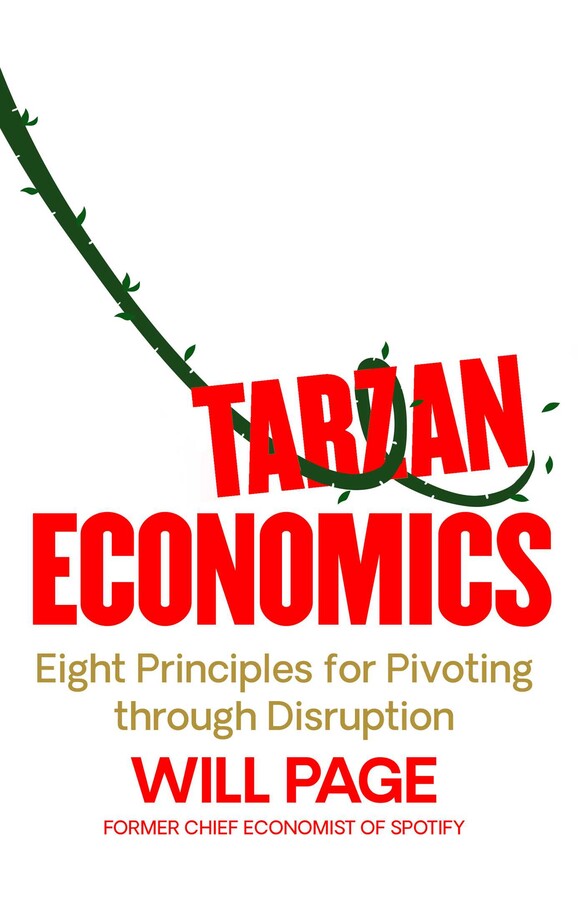The idea behind Tarzan Economics is, in its essence, that “if the vine we are holding onto is withering, we can have confidence to reach out for a new one.” This thesis expounded in Will Page’s highly engaging book is that the music industry “got there first”. It may have started out by getting things badly wrong when originally faced with the challenge of digital, but it then “worked out how to pivot and thrive.” And to grow again. The conclusion that Page draws from this chain of events is that the music industry – and also he – has lessons to teach other sectors. Media, finance, government... Yes, all of them, Page argues here, face their “Napster moment.”
Will Page’s vantage points within the music industry in the past 15 years have been good ones from which to observe it. In his role as the first ever economist at the UK’s main royalty collection society MCPS-PRS Alliance, later PRS for Music from 2006 until 2012, he wrote influential articles (at the time) such as “Is the Price of Recorded Music Headed Towards Zero?” (2006). He then served as Chief Economist at Spotify from 2012 until 2019, which was the period from just after the Swedish-founded company’s launch in the US until one year after its stock market float. The blurb for the book calls him "the global music industry’s first 'rockonomist’"; it is a moniker he clearly likes.
 He is, unsurprisingly, particularly adept at unpicking industry data from organisations such as IFPI, component by component and beneficiary by beneficiary, and looking at the value of copyright and how it is distributed. His writing on these subjects in this book and elsewhere is always very instructive indeed. After all, using and explaining that data, elucidating how the complex value chains in music work – or fail to – was his meat and drink in his day jobs for many years.
He is, unsurprisingly, particularly adept at unpicking industry data from organisations such as IFPI, component by component and beneficiary by beneficiary, and looking at the value of copyright and how it is distributed. His writing on these subjects in this book and elsewhere is always very instructive indeed. After all, using and explaining that data, elucidating how the complex value chains in music work – or fail to – was his meat and drink in his day jobs for many years.
Tarzan Economics, is on the one hand a popular economics book – Page is keen to stress that “perfectly rational economics exists totally independently of economists...you know more economics than you realise.” And on the other, it is a highly entertaining and well-written personal memoir of Will Page’s life. In the latter category we find everything from family holidays on beaches in Scotland to a “dour goalless draw” watching Hearts at Tynecastle Park...in the company of an Edinburgh-based investor who, it turned out, was later to become a substantial backer of Spotify and has been an advocate of its managment and business model.
There are numerous anecdotes about moments of truth dawning in the process of unravelling and understanding the vast, detailed and powerful data sets that Spotify is able to amass every day in the normal course of its business. Given the power of the data they own, the realisations, though excellently told, can come across as somewhat trite. The awareness, for example, that the huge chart success of Meghan Trainor’s “All About That Bass” started because the song was on a Starbucks playlist, all because queuing coffee drinkers were checking it out on Shazam. Or how the success of the Spotify "Discovery Weekly" playlist was – in contrast to many other attempts to attract users to such playlists – mainly attributable to it being launched on Mondays. These are good, entertaining, vividly told stories, but they don’t always lift the lid in a meaningful way.
Arguments on the rights and wrongs of the power wielded by tech companies do get a proper airing in the chapter, “Pivotal Thinking”. But as those arguments emerged, I did start to wonder whether the author’s ingrained habit of being aligned and on-message for corporate interests in music for a decade and a half has truly been shaken off yet. “Conventional thinking, that monopolies are ‘bad’” Page writes, “needs to be challenged by the opposite idea: that monopolies that compete for convenience can also be a force for good.” That, to say the least, is an argument with another side to it.
Tarzan Economics is a fascinating and a very enjoyable read. But as I tried to come to grips with some of the polemic, I found myself increasingly wanting to riff off that well-worn BBC phrase: "other opinions are available."
- Tarzan Economics is published by Simon & Schuster on 1 April 2021
- Tarzan Economics website
- More book reviews on theartsdesk















Add comment